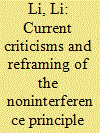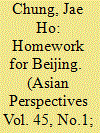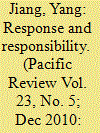| Srl | Item |
| 1 |
ID:
148535


|
|
|
|
|
| Summary/Abstract |
The “Five Principles of Peaceful Coexistence” was born against the background of poverty, powerlessness and humiliation. It became the guiding principle of China`s foreign policy since it was first proposed in 1953. However, several reasons led to increasing criticisms of it, especially regarding the noninterference principle. These reasons include the economic interdependence and blurring of boundaries in a globalized world, the rise of China`s power, and China`s extending overseas interests. The criticisms are reflected in three aspects: whether sovereignty allows for humanitarian intervention against the background of proliferating international human rights norms; whether China`s behavior obeys the noninterference principle; and whether this principle can serve China`s national interests. Chinese scholars respond to these criticisms in terms of three aspects: the noninterference principle should be flexibly interpreted depending on the specific background; many alternate terms of the principle like “creative involvement,” “constructive intervention,” and “participatory advocacy” were put forward; China`s sticking to the fundamental sovereignty principle has never changed. It is sensible and necessary for China to reframe the noninterference principle based on analysis from international, regional and domestic levels. This reframing should protect China`s national interests while matching the image of “responsible great power.”
|
|
|
|
|
|
|
|
|
|
|
|
|
|
|
|
| 2 |
ID:
177649


|
|
|
|
|
| Summary/Abstract |
This analysis observes that in 2020 China is a global power with global ambitions and a near-global presence. Terms
such as “G2,” “global stakeholder,” “strategic competitor,”
and “hegemonic candidate” no longer ring hollow as they
did ten years ago. However, it is unclear whether China’s
challenge to the United States will be sustainable in the medium to long run. The essay considers five hurdles in Beijing’s
path to a “responsible great power”—assuming that China
does hope to be one. Certainly, the world does not wish to
see the emergence of an irresponsible China.
|
|
|
|
|
|
|
|
|
|
|
|
|
|
|
|
| 3 |
ID:
100312


|
|
|
|
|
| Publication |
2010.
|
| Summary/Abstract |
China's behaviour in East Asian financial cooperation has overall changed from passively responding to external pressures to taking proactive initiatives, which are highlighted by Chinese elites as evidence of a sense of responsibility. China has taken varied positions towards proposals for Asian financial regionalism, from 'silent' objection, to lukewarm or superficial support, to enthusiastic participation and substantial contribution, and this variance has not always taken place in a chronological order. Despite much speculation over the trajectory of China's role in East Asian regionalism, there has not been a study focused on China's policymaking towards East Asian financial cooperation. Therefore, this paper fills the gap by analysing the factors and policymaking processes that have led to those varied positions. It argues that China, recognising the momentum in the region to enhance cooperation, has replaced the blunt dismissals of proposals, particularly those from Japan, with a more subtle approach that is aimed at ensuring China's influence and promoting the image of a responsible great power; that the extent to which it can contribute to this process is mainly constrained by its economic conditions, particularly the financial institutions.
|
|
|
|
|
|
|
|
|
|
|
|
|
|
|
|